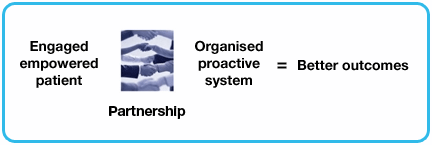The Year of Care (YoC) is about improving care for people with long-term conditions (LTCs) in the NHS. It is about putting people with LTCs such as diabetes firmly in the driving seat of their care, and supports them to self-manage. It transforms the diabetes annual review into a constructive and meaningful dialogue between the healthcare professional and the person with diabetes.
The YoC sets out to demonstrate how routine care can be redesigned and commissioned to provide a personalised approach for people with LTCs and has successfully done this using diabetes as an exemplar in three pilot sites: Calderdale and Kirklees PCTs; NHS North of Tyne; and Tower Hamlets PCT.

The approach used care planning as a central component to drive a proactive process of care which improved patient involvement, provided a more personalised approach and supports self-management. In diabetes it replaces the annual surveillance review, which is sometimes a 'tick-box activity', with a collaborative consultation.
The programme has demonstrated how to deliver personalised care in routine practice for people with diabetes and has developed commissioning support and a new commissioning model for LTCs. To achieve the best outcomes, both effective care planning and commissioning have to be in place and working together.
The experience of the YoC pilot has shown that, if care planning and support for self-management are implemented systematically across a healthcare community, there can be improvements in patient and professional experience, care processes and clinical outcomes.
Key programme achievements
Some of the key achievements of the programme include:
- Care planning was adopted as the norm in the majority of practices across the pilot communities: 76 per cent of people with Type 2 diabetes on practice registers had at least one care planning consultation
- Patient-reported involvement in care rose from 52 per cent to 82 per cent in Tower Hamlets
- Improved clinical outcomes, including blood pressure and diabetes control
- Improved diabetes care processes and data collection
- Qualitative research demonstrated that people with diabetes reported improved experience of care and changes in self-care behaviour
- Clinicians reported greater job satisfaction and better organisation and team work
- Improved productivity showing care planning is cost neutral at practice level, and there are significant savings for some
- The core philosophy and approach is being transferred to other LTCs in a variety of NHS settings.
The YoC approach has been recognised and adopted by NICE in the Quality Standard statement pertaining to care planning. The Royal College of General Practitioners has also adopted Care Planning as a professional standard, based on the Year of Care House Model.
Further information
For further information about the Year of Care programme, please contactenquiries@yearofcare.co.uk, or go to theYear of Care website.
Downloads
-
Year of Care evaluation report on the pilot programme (PDF, 4MB)
The Year of Care evaluation report shows how the pilot programme was carried out, and what was found in the real world of the NHS, providing practical evidence and support.The Year of Care evaluation report shows how the pilot programme was carried out, and what was found in the real world of the NHS, providing practical evidence and support. -
Year of Care pilot case studies (PDF, 812KB)
Case studies, describing what each of the pilot sites did, their learnings and experiences.Case studies, describing what each of the pilot sites did, their learnings and experiences. -
Thanks for the Petunias – a guide to developing and commissioning non-traditional services to support the self management of people with LTCs (PDF, 809KB)
Guidance on how to put in place non-NHS services to support people living with diabetes.Guidance on how to put in place non-NHS services to support people living with diabetes.
